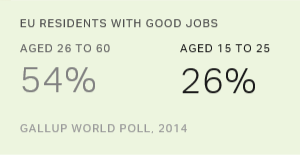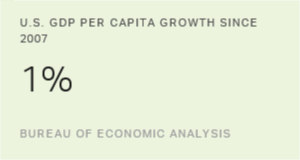Story Highlights
- Europeans aged 15 to 25 are most likely to be unemployed
- Youth Guarantee program aims to assist people under 25 to get good jobs
- New business startups are the keys to job creation
Across the European Union, people aged 15 to 25 are most likely to be unemployed. They are also much less likely to be employed full time for an employer compared with adults aged 26 to 60, according to Gallup World Poll data. These young adults are on the cusp of their careers, yet they aren't landing good jobs.
"Being self-sufficient when you're under 25 is really difficult in Spain," says Paloma, an 18-year-old studying sound engineering and music production in her first semester at the University of Barcelona. She says that her peers are all looking to leave Spain after they graduate because there aren't any good jobs available.
Unfortunately, Paloma's story is a common one in the European Union. Gallup defines a good job as one with at least 30 hours per week with a consistent paycheck from an employer. In 2014, almost four in 10 adults aged 15 to 25 (39%) were not in the workforce, compared with almost two in 10 of those aged 26 to 60 (19%). This difference largely reflects the high proportion of young people still in school. The percentage of the youngest adults in the EU who have a good job (26%) is less than half of those aged 26 to 60 (54%).
| Adults aged 15 to 25 | Adults aged 26 to 60 | Adults aged 61 and older | |||||||||||||||||||||||||||||||||||||||||||||||||||||||||||||||||||||||||||||||||||||||||||||||||
|---|---|---|---|---|---|---|---|---|---|---|---|---|---|---|---|---|---|---|---|---|---|---|---|---|---|---|---|---|---|---|---|---|---|---|---|---|---|---|---|---|---|---|---|---|---|---|---|---|---|---|---|---|---|---|---|---|---|---|---|---|---|---|---|---|---|---|---|---|---|---|---|---|---|---|---|---|---|---|---|---|---|---|---|---|---|---|---|---|---|---|---|---|---|---|---|---|---|---|---|
| % | % | % | |||||||||||||||||||||||||||||||||||||||||||||||||||||||||||||||||||||||||||||||||||||||||||||||||
| Employed full time for an employer | 26 | 54 | 6 | ||||||||||||||||||||||||||||||||||||||||||||||||||||||||||||||||||||||||||||||||||||||||||||||||
| Employed full time for self | 3 | 8 | 5 | ||||||||||||||||||||||||||||||||||||||||||||||||||||||||||||||||||||||||||||||||||||||||||||||||
| Employed part time, do not want full time | 10 | 7 | 8 | ||||||||||||||||||||||||||||||||||||||||||||||||||||||||||||||||||||||||||||||||||||||||||||||||
| Unemployed | 11 | 7 | 1 | ||||||||||||||||||||||||||||||||||||||||||||||||||||||||||||||||||||||||||||||||||||||||||||||||
| Employed part time, want full time | 12 | 6 | 2 | ||||||||||||||||||||||||||||||||||||||||||||||||||||||||||||||||||||||||||||||||||||||||||||||||
| Out of workforce | 39 | 19 | 77 | ||||||||||||||||||||||||||||||||||||||||||||||||||||||||||||||||||||||||||||||||||||||||||||||||
| Gallup World Poll, 2014 | |||||||||||||||||||||||||||||||||||||||||||||||||||||||||||||||||||||||||||||||||||||||||||||||||||
Youth Unemployment in the EU
Though youth unemployment is a pressing issue for the EU as a whole, the severity of the unemployment problem varies from country to country. Germany had a relatively lower rate of youth unemployment (6%) compared with the EU as a whole (11%), according to 2014 Gallup World Poll data.
Vivian, a 19-year-old in Stuttgart, Germany, is optimistic about her chances of employment. "I've never worried about getting a job. It doesn't matter if you're a woman or a man, you'll get paid for the work," Vivian says.
Not all young adults in the EU are as fortunate as those in Germany. Spain has a much higher rate of unemployment among adults aged 15 to 25 (16%) than Germany and a lower proportion of workers who are employed at a job working at least 30 hours per week (17% in Spain, compared with 24% in Germany).
The Youth Guarantee
To combat youth unemployment, the European Commission has established the Youth Guarantee, a €21 billion annual program to ensure that people younger than age 25 get a quality, concrete offer -- such as a job, continued education, apprenticeship or traineeship -- within four months of them leaving formal education or becoming unemployed. The estimated cost to establish the program within the Eurozone is 0.22% of GDP, but the estimated costs to provide benefits to unemployed youth and in lost earnings and taxes is €153 billion a year if the EU takes no action.
Finland provides a success story for what the Youth Guarantee program aims to accomplish. A Eurofound evaluation determined that in 2011, 83.5% of young job seekers received a successful offer within three months of unemployment in 2011, a result that met the target set by the Finnish government.
The European Commission is hoping to replicate Finland's success in other countries by using customized Youth Guarantee programs to improve rates of youth unemployment. However, the commission's recommendations for the Youth Guarantee differ between specific countries given the varying degrees of youth unemployment. Though the program focuses on improving employment among Europe's youth, it also recognizes the need for job creation in Europe.
Job Creation in Europe
Gallup's research shows that small-business startups are instrumental in job creation. The European Commission noted that small- and medium-sized enterprises created 85% of net new jobs in the EU between 2002 and 2010.
Adeline, a 25-year-old from Lyon, France, provides a more recent example of this. Though she works part time at the front desk of a local hostel, she hopes that the local food-cart startup where she also works part time will become large enough to hire her full time. "I hope to move up into management," she says.
According to the Organisation for Economic Co-operation and Development (OECD), youth entrepreneurship is integrated into Youth Guarantee plans in 14 of 28 EU countries, and another seven countries allude to youth entrepreneurship in their plans.
To further the goals of the Youth Guarantee program, EU member countries could use some of their funds to develop entrepreneurship among European youth by identifying young adults who have the talents that predispose them for entrepreneurial success. Gallup scientists have identified 10 entrepreneurial talents that highly successful entrepreneurs possess that are instrumental in starting and growing a business. People with these talents need to be identified and developed to increase their chances of future success as entrepreneurs and job creators.
Marika, a 24-year-old graduate student and part-time worker in a local laundromat in Kraków, Poland, says, "It would be easier to find a good job if there were more small companies." For this reason, it's imperative for the EU to help small businesses flourish and create good, quality jobs for residents who want them -- and particularly for its youth. By supporting entrepreneurship and small businesses, the EU can catalyze its growth by using job creation as its economic accelerator.
Survey Methods
Results are based on face-to-face interviews with at least 1,000 adults, aged 15 and older, conducted in 2014 in Austria, Belgium, Republic of Cyprus, Czech Republic, Denmark, Finland, France, Germany, Ireland, Italy, Lithuania, Luxembourg, Malta, Netherlands, Poland, Portugal, Romania, Slovakia, Slovenia, Spain, Sweden and the U.K. Quoted material comes from separate, non-scientific interviews conducted July 18-26, 2015. For results based on the total sample of national adults in each country, the margin of sampling error is ±3.3-4.1 percentage points at the 95% confidence level. All reported margins of sampling error include computed design effects for weighting.
Learn more about how the Gallup World Poll works.


